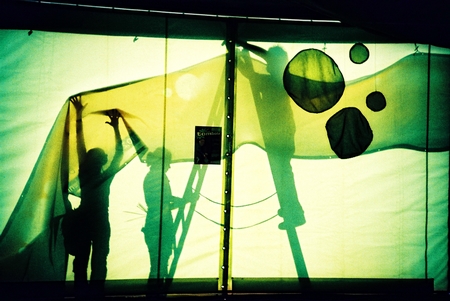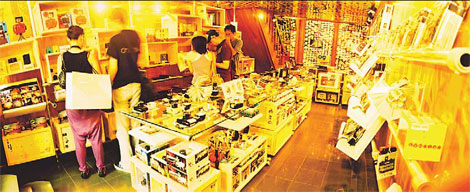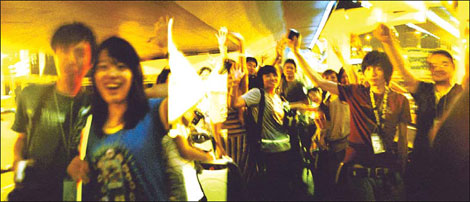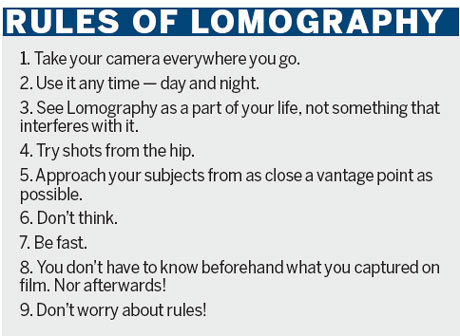
 |
|
An image taken by LC-A+ Lomo camera. Photos provided to China Daily |
Lomography focuses on fun, bright colors, accidental blurring and serendipitous discovery. It encourages photographers to simply shoot from the hip. This back-to-basics camera and its appealingly casual approach to photo taking is casting a spell on Shanghai's creative set, just as it has worked its magic on a rapidly expanding community worldwide.
The Lomo, originally an enigmatic Russian camera popular in the 1950s, became fashionable after two Austrians rediscovered it in 1991. Soon, young photographers across Europe were being charmed by the unique images this little camera produced, and the Austrians negotiated an exclusive distribution deal outside of Russia.
Clever marketing, and perhaps a knee-jerk reflex against the too-perfect images produced by digital single-lens reflex cameras (DSLR) have made the Lomo a cult camera.
The art of Lomography promotes a very casual, snapshot approach to photography, eschewing the bulky paraphernalia commonly associated with other cameras. In fact, over-saturated colors, off-kilter exposure, creative framing and other "happy accidents" are actually encouraged.
Also, Lomo cameras use analogue film and a return to good old-fashioned film developing.
 |
|
The inside of Lomography Gallery on Jinxian Road photographed by a Lomo camera. |
 |
|
A gathering of Shanghai Lomography enthusiasts. |
In Shanghai, the six-storey Lomography Gallery on Jinxian Road, inside the former French Concession, has become ground zero for Lomo fans in China since it opened two years ago. The gallery also has branches in Beijing and Guangzhou.
Supervisor Aloho Xie says its exhibitions and workshops are never short of participants and sales are booming as the city's residents, many of them expatriates, click into the Lomo aesthetic.
"We're basically seeing a 30-percent increase in sales each year," he says, adding that he sells about 20 to 50 cameras daily.
"Our most impressive event to date was probably our 'Diana World Tour' last year. We had 50 Lomographers touring Shanghai on a double-decker bus taking weird and wonderful pictures of the city at night."
Diana is not a reference to the late British princess but rather, to one of the store's most popular cameras, the retro-looking Diana F+. The plastic camera produces square photos on 120 mm film and comes with a flash attached.
"This is definitely the girls' favorite, because they have a lot of room to play around. They can even choose different colors to match their outfits," says Xiao Si, a salesgirl at the Shanghai store. At 740 yuan ($111), it is also one of the most affordable cameras.
The LC-A+ and Holga are also hot sellers, as is the Fisheye, which takes hemispherical images; the Colorsplash, which lets you manipulate different hues and the Pop-9, which produces nine identical images simultaneously.
Unlike digital or single-lens reflex cameras, Lomo cameras look very basic and rely on a simple image-forming technique. Film loading, winding and focusing functions are controlled manually, and the only thing automatic is exposure, of which there are a limited number of options.
Lomo's antiquated lens technology actually produces higher levels of saturation, as the cameras are more receptive to primary colors like red, yellow and blue. And thanks to their imperfect image-forming technique, Lomo photographs often exhibit a vignette effect around the edges - as if they are shot inside a tunnel.
Other optical distortions, such as under-exposure and color bleeds, are some of the "happy accidents" that are typical of lomography.
Practitioners tend to live by the motto: "Don't think, shoot".
Aloho Xie says beginners should start experimenting with the LC-A+, which retails at 1,980 yuan and is the store's top seller. It is similar to the earliest Lomo camera, the Russian-made LC-A (Lomo Kompakt Automat), which stopped production five years ago. Trademarks of the LC-A+ include shadowy vignettes and over-saturated colors.
Zhang Zhuoqun, a university student from Beijing, described her Lomo as "the most special camera ever".
"I can't resist its charms. I take it with me everywhere to record my everyday life."
